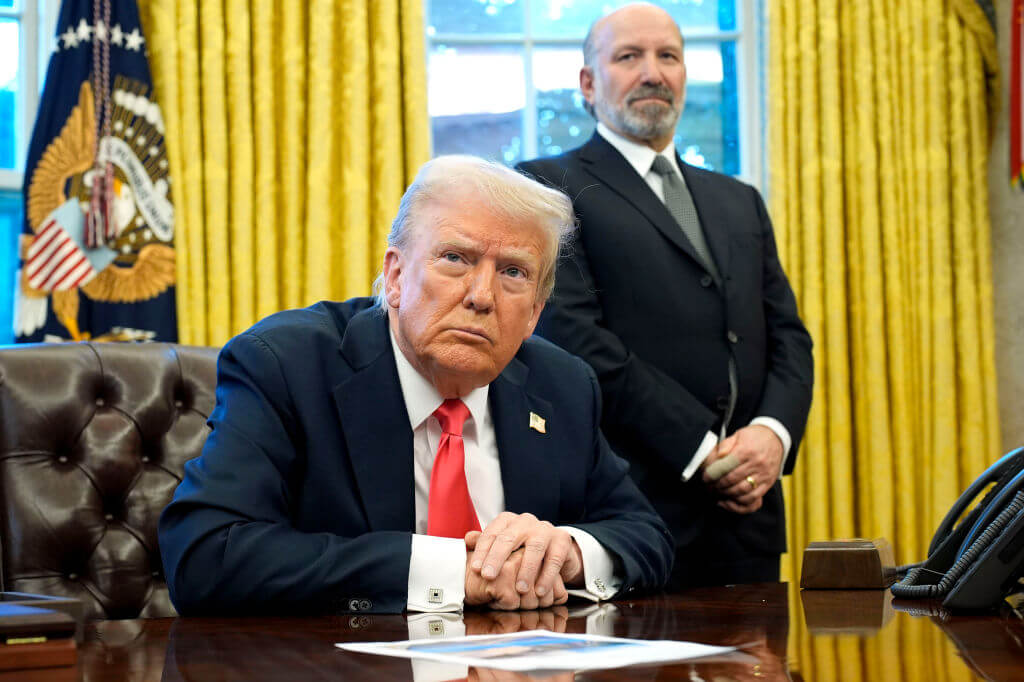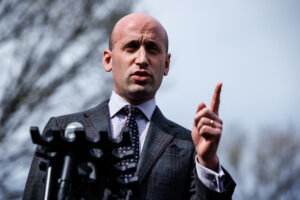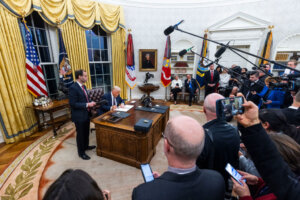These are the most influential Jews in Trump’s first 100 days
Steve Witkoff, Laura Loomer, Stephen Miller are helping to implement policies roiling the nation, including tariffs and deportations

President Donald Trump, left, and Howard Lutnick, commerce secretary, on Feb. 25. Photo by Yuri Gripas/Abaca/Bloomberg via Getty Images
Tariffs, deportations, America’s withdrawal from the global community: Donald Trump’s first 100 days have rattled the country and the world, and a number of the advisers shaping his second term are Jewish.
It’s a sharp departure from his first term, when some – although not all – of Trump’s Jewish advisers were seen as moderating his impulse to break things.
The common thread among Trump’s current Jewish advisers is that they are not only loyalists but also central to his most controversial policy decisions and public messaging — from escalating tariff disputes and mass deportation plans to an isolationist foreign policy.
Gone are the Jewish moderating influences of Trump’s first term, among them his son-in-law Jared Kushner, top Middle East negotiator Jason Greenblatt, Israel Ambassador David Friedman, Treasury Secretary Steven Mnuchin, and Gary Cohn, who was the director of the National Economic Council. Mnuchin counseled a degree of conciliation toward China, Kushner and Greenblatt cultivated relationships with Palestinian officials and Cohn backed robust trade policies. Cohn and Kushner – and Trump’s Jewish daughter, Ivanka – also pressed Trump to distance himself from white nationalists. Friedman helped nudge Trump to gut the Iran nuclear deal.
Jewish advisers in Trump’s second term are helping to undo whatever moderation characterized his first term. They are driving key initiatives including detaining and deporting foreign students involved in pro-Palestinian campus protests, negotiating a possible nuclear deal with Iran, brokering a ceasefire in the Russia-Ukraine war, and brokering a resolution to end the war in Gaza. And they are sidelining the national security hawks and staunch Israel supporters – Jewish and non-Jewish – whose views held sway during Trump’s first term.
Trump’s approval among American Jews remains low. A recent poll conducted by the Mellman Group for the Jewish Electoral Institute found that 72% of American Jewish voters disapprove of Trump’s job performance so far. The poll has a margin of error of 3.5 percentage points.
Here is a look at the key Jewish figures in Trump’s inner circle:
Steve Witkoff, special envoy to the Middle East

Real estate magnate Steve Witkoff was tapped to end the 18-month-long war in Gaza that started with the Oct. 7, 2023, Hamas terror attacks on Israel, and to advance Trump’s vision of expanding the Abraham Accords, the normalization agreements brokered by Kushner in 2020, to include Saudi Arabia. With no diplomatic experience, Witkoff played a critical role in securing a ceasefire and hostage exchange between Israel and Hamas before Trump’s inauguration.
Witkoff has since intensified his efforts to extend the ceasefire or, at the very least, secure another hostage exchange, one that would include the release of Edan Alexander, a 21-year-old Israeli-American and the last known living U.S. citizen held by Hamas in Gaza.
Witkoff was also behind Trump’s controversial plan for U.S. control of Gaza, drawing on his real estate expertise after visiting the area. In recent weeks, Witkoff expanded his diplomatic portfolio to leading discussions with Russian President Vladimir Putin on ending the war against Ukraine, and participate in direct talks with Iran’s foreign minister, Abbas Araghchi. Trump’s tendency to side with Putin and his openness to a deal with Iran have alarmed Republican foreign policy traditionalists, who see both countries as threatening U.S. leadership in the world.
Howard Lutnick, secretary of commerce

The Cantor Fitzgerald CEO, who co-led Trump’s transition team and served as Trump’s most enthusiastic liaison to the business world during the campaign, has become a major force in Trump’s economic strategy.
Lutnick is personally negotiating — alongside Treasury Secretary Scott Bessent — with foreign governments on tariffs and trade issues. He has also become one of the administration’s most visible economic defenders, frequently appearing on major television networks to downplay fears of an impending recession. Lutnick was also tasked to enlist Elon Musk, Tesla CEO, to lead the newly established Department of Government Efficiency, which has resulted in massive cuts to the federal bureaucracy.
Stephen Miller, deputy chief of staff and homeland security adviser

Miller, known in Trump’s first term as the ideological driver of Trump’s nationalist agenda, has force multiplied his influence in Trump’s second term. Miller has played a central role in shaping most executive authority policies and is instrumental in designing the new mass deportation plan, which Trump unveiled in March. He continues to drive policy on broader law enforcement and national security measures, having near-unfiltered access to Trump, and he publicly champions these efforts.
In one striking moment during a photo opportunity with El Salvador’s President Nayib Bukele earlier this month, Trump asked Miller to push back against the media’s scrutiny of the wrongful deportation of Kilmar Abrego Garcia to one of Bukele’s notorious prisons.
Will Scharf, White House staff secretary

Scharf, a former prosecutor and Trump’s personal attorney, oversees the flow of information to the president and manages the circulation of material among senior staff.
He is almost always at the president’s side, handing him the black leather folder containing drafted executive orders and accompanying Trump on domestic trips.
Scharf shares his visibility around Trump on his personal Instagram page. In March, he reposted a picture that Press Secretary Karoline Leavitt had taken of him sitting on Air Force One, giving Trump’s signature thumbs-up in front of plates of lobster tacos. “For the record, I had the veggie tacos,” quipped Scharf, who is Orthodox, in a caption.
Scharf and Lutnick co-hosted a Passover event for staffers and addressed a delegation of Agudath Israel of America, an Orthodox advocacy group.
Adam Boehler, special envoy for hostages

Trump initially nominated Boehler, a top official in his first term, as special envoy for hostages on an ambassador level. Boehler has already helped secure the release of at least 26 Americans who were held hostage abroad.
He made headlines in March as the first U.S. official ever to sit down directly with Hamas to negotiate the release of American hostages held in Gaza. Trump okayed the Hamas talks, but Boehler’s evident enthusiasm for the talks caused an uproar among Israeli leaders and Senate Republicans.
He was reportedly pulled off the Gaza hostage file and later withdrew his nomination for the Senate-confirmed position amid growing skepticism about his confirmation, fueled by unorthodox remarks, including saying Hamas negotiators were “pretty nice guys.”
Weeks later, Boehler cemented his influence in the administration. Trump expanded Boehler’s portfolio, creating a new temporary role of special envoy for hostage response, which does not require Senate confirmation. Boehler now coordinates across U.S. government agencies on all hostage-related issues and reports directly to both Trump and Secretary of State Marco Rubio.
Morgan Ortagus, deputy special envoy to the Middle East

Morgan, a deputy to Witkoff, has taken the reins on U.S. engagement with Lebanon as Witkoff’s focus has expanded to include Russia and Iran, becoming the primary U.S. interlocutor for Trump’s “red line” policy against Hezbollah’s political participation in the country’s leadership. Ortagus provoked criticism across Lebanese social media when she donned a Star of David ring during a meeting with President Joseph Aoun. She also uses her X account to press Lebanese leaders on disarming Hezbollah, at times trolling Hezbollah with pointed posts.
Laura Loomer, the far-right influencer with access to Trump

Loomer, a self-described “proud Islamophobe” and far-right internet activist, is not in government, but has influence over Trump’s personnel decisions. Earlier this month, she helped spur the firing of National Security Council officials appointed under Biden. At least six staffers were dismissed after an Oval Office meeting between Loomer and Trump, Vice President JD Vance and Susie Wiles, the White House chief of staff.
Loomer’s access caused tension within the West Wing, even as the second-term White House has improved internal discipline. In a recent podcast interview, she described how her intelligence prompted Trump to bypass National Security Adviser Mike Waltz. “Donald Trump is my biggest ally in the White House. I don’t get invited to events,” Loomer claimed.
During the campaign, Trump allies blamed Loomer for Trump’s false and jaw-dropping claim during his TV debate with Vice President Kamala Harris that Haitian immigrants in Springfield, Ohio, were stealing and eating people’s cats and dogs.
Where is Jared Kushner?

Kushner, who was the most powerful administration official in Trump’s first term and brokered the normalization deals between Arab countries and Israel in 2020, has distanced himself from politics and government since 2021.
He was reportedly involved behind the scenes during the transition, but since Trump took office, he has been absent. Last month, he declined a request by Harvard’s president, Dr. Alan Garber, to arrange a meeting with Trump as the administration increased financial pressure on the university. Kushner is a Harvard alum. As Trump’s son-in-law, Kushner continues to have the president’s ear, and is close with Witkoff and Boehler, both longtime friends. Trump also nominated his father, Charles Kushner, as U.S. Ambassador to France.

















